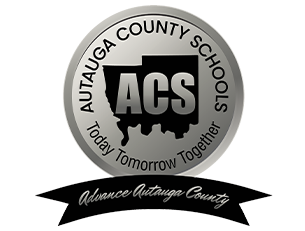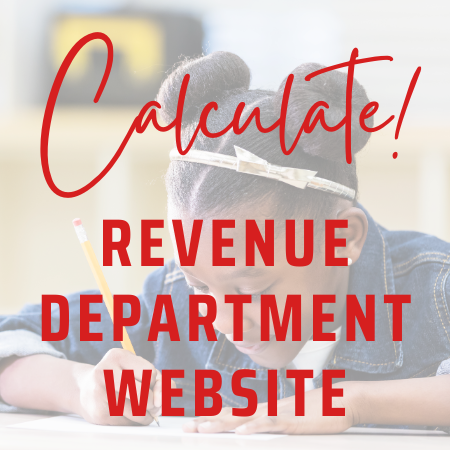
Planning for the Future with Ad Valorem Property Tax Vote
Autauga County residents will soon have the opportunity to vote on an ad valorem tax increase designed to add an additional $7 million annually to the school district’s local funds. Act 2024-257 will be included as a constitutional amendment on the general election ballot scheduled for November 5, 2024. All registered voters in Autauga County will have the opportunity to vote yes or no for the amendment - voting yes to be in favor of the tax increase or voting no to oppose the tax increase. Autauga County residents currently pay 10 mills of ad valorem school taxes, the required state minimum. All property taxes are credited to the system’s local funding. Any local dollars, above the state-required 10 mill collection, are how projects are funded, local teacher units are provided, and bond debt is paid. The additional seven mills allows for flexibility beyond the mandated threshold, providing a source of funding that can be used at the discretion of district leadership.
“This is a crucial moment for our district,” expressed Lyman Woodfin, superintendent of Autauga County Schools. “We’re okay right now, the true question is going to be when the 2025-2026 school year hits. We play the three shell game really well here. We are known for doing a lot with very little, but the reality is that there is coming a time when we will not be able to play it quickly enough to keep up with the expenses under the system’s current model. Our model will change either way this vote goes but the question is how does it look on November 6.”
Click here to preview the sample ballot for the upcoming election.
Resident Impact
The district is pursuing an additional seven mills of local funding. This increase in ad valorem taxes would increase local funding by approximately $7,000,000 per year. Property taxes are estimated to increase $10 per $100,000 in assessed value for each additional mill. The proposed seven-mill increase would cost an additional $70 per year in taxes per $100,000 of value for owner-occupied residential property resulting in an approximate 20% increase. However, there are Alabama Department of Revenue exemptions that include age, disabled status, and current use policy for large landowners that property owners can apply to receive.
Estimated Home Value // Annual Proposed Tax Increase*
$500,000 >> $350 increase
$400,000 >> $280 increase
$300,000 >> $210 increase
$200,000 >> $140 increase
$100,000 >> $70 increase
$50,000 >> $35 increase
* for owner-occupied residential property
According to the Alabama Department of Revenue, a mill is one-tenth of one cent. The number of mills an agency charges for taxes is multiplied times the assessed value of the property, and the result is the tax amount due. To find out what a home is worth in Autauga County, click here to input the owner’s name and locate the record. After locating the “market value” of the property, use the chart above to determine an estimate of the projected increase in property taxes for residential homes claiming a homestead exemption.
FY2025 Explanation
The district’s newly approved $109 million budget is 77% earmarked, meaning that the majority of all funding is required to be spent in particular areas with very little opportunity to move funds where most needed. The challenge of largely earmarked federal and state funding is that it leaves only the local funding to pay for anything else the system needs.
Funding Breakdown
State 63%
Funds include state tax appropriations not related to local tax funding.
Local 23%
Funds include sales tax, community grants, ad valorem, and the Helping Tags tax.
Federal 9%
Funds include the Child Nutrition program paybacks, grants, and local school funds which includes fundraisers and fees.
State funding is the largest source of revenues and is determined by the district’s total number of students, or Average Daily Membership (ADM) as it’s referred to in the industry. The FY2025 funding is calculated from the previous school year as it is based on ADM counts conducted in the fall of 2023. For this fiscal year, designated funding for teaching units was decreased by nearly nine positions. “We spend the majority of our money, as we should in instructional areas and services. It’s 71%,” mentioned Lesley Poe, chief school financial officer, during the second public budget hearing.
The district plans to end FY2025 with a fund balance of $40 million, or approximately five months of expenses, which is typically indicative of a system planning for near future capital projects, but Autauga County Schools is planning for something entirely different. “We are planning for something down the road,” said Poe, “we are planning to keep our schools staffed is what we are doing.”
The challenges that Autauga County Schools face in the FY2025 is declining student enrollment, use of heavy federal funding to support schools that don’t earn sufficient teaching units, utilizing teaching units to ensure schools have assistant principals and counselors as not all schools earn full-time positions, increase in special education population that funding doesn’t adequately cover, requirement to implement state-issued curriculum without sufficient funding, maintaining summer programs without ESSR (COVID) funding, application of federal funding now that the district participates in the free breakfast and lunch program for all students, along with additional items outlined in the second FY2025 public budget hearing and available in the second FY2025 budget hearing slide deck presentation.
As the FY2025 stands, the district anticipates a $200,000 surplus that would be responsible for funding any unexpected expenses throughout the year. “We’ve done our best to estimate every expense to provide a realistic view of our financial situation,” stated Lyman Woodfin, superintendent of Autauga County Schools. “At the end of the day, this $200,000 would be responsible for fulfilling anything else we need this year. Projects like HVAC replacement, security camera repairs, additional classroom staff such as aides for special needs students, or additional security guards.” Any expense not allocated for beyond $200,000 would require the district to pull from its reserves as indicated above.
“Right now we are okay, but we still have to be mindful of what projects we pursue and how we lay out what our goals are,” said Poe during her first FY2025 public budget hearing presentation. For everything that we do, we are going to have to start thinking about the effects of that spending on future years.”
Click here to see Alabama’s overall school system rankings based on total per-pupil revenue sources.
FY2024 Explanation
Autauga County Schools is currently ranked 128 out of 138 school systems in the state when totaling all funding: federal, state, and local monies. A comparison of various school district's across the state is available here. The district’s $100+ million budget is 87% earmarked, meaning that the majority of all funding is required to be spent in particular areas with very little opportunity to move funds where most needed. “Of the $103.5 million dollars, approximately $90 million is allocated for specific use, meaning when you pay state or federal taxes for the benefit of our school district, those funds are sent to us with stipulations on what they can and can not be spent on,” stated Lesley Poe, chief school financial officer, during the 2024 budget video posted on the Business & Finance Department’s webpage.
Funding Breakdown
State 65%
Funds include state tax appropriations not related to local tax funding.
Local 23%
Funds include sales tax, community grants, ad valorem, and the Helping Tags tax.
Federal 12%
Funds include the Child Nutrition program paybacks, grants, and local school funds which includes fundraisers and fees.
The $90 million of designated funding includes expenses such as employee salaries and benefits, classroom instructional support, student materials, technology, textbooks, libraries, transportation, career tech programs, and general administrative items. “We have to be very careful to ensure that these specified use funds are spent correctly to avoid misappropriating funds, which is against state and federal law,” said Poe during the same video overview. The remaining $13.5 million, or 13% of total revenues, is unallocated funding that allows for the purchase of anything not covered in the categories above. Purchases that typically fall into this category include facilities upkeep, basic maintenance, new facilities, office & cleaning supplies, utilities, transportation & special education expenses not covered by state or federal funds, technology licenses, the district’s financial system, and personnel costs not fully funded otherwise.
“The biggest challenge is that the district’s federal and state funding is largely earmarked which leaves only the local funding to pay for anything else the system needs. There is simply not enough to go around with the expiration of COVID funding and the rising cost of goods and services,” stated Woodfin in his virtual State of the Schools presentation.
Ad Valorem Background
The Autauga County Board of Education unanimously voted to pass the seven mill property tax increase resolution during the April 2024 board meeting as the first step in a series of actions required to bring a referendum to a ballot in the near future. Once the resolution was approved, the request for additional funding advanced to the state legislature for approval as a constitutional amendment; therefore, putting the request on voter’s ballots in Autauga County. When the legislation was enacted as Act 2024-257, it was decided that the residents would vote during the general election to avoid the additional costs of holding a special election; funds the school district can not afford to allocate in an effort to secure additional funding.
Ad Valorem Passage
A successful referendum would allow for the school system to have access to additional funding that is not earmarked, allowing the Autauga County Board of Education and district administrators the ability to meet immediate needs designed to stabilize the system. These needs were clearly articulated by Superintendent Woodfin during his State of the Schools meetings during the spring semester of the 2023-2024 school year, including:
- Hire 10-20 local teaching units & additional support staff,
- Purchase security enhancements,
- Create performance-based employee incentive program directly tied to schools’ state report card data
- Renovate aging and outdated facilities, and
- Reduce debt
“Systems that make it happen in terms of facility upgrades, additional teacher units, and things that make your system great often come out of your local funds,” stated Superintendent Woodfin. “When we pay all of our bills there’s just not a lot of local dollars left, so this increase in ad valorem would help us have a bigger pot of money to spread out in our district to make our teachers’ jobs better and give our students a better quality education.”
At this time, Autauga County Schools will not use the increased funding to construct new facilities; however the district hopes to renovate some of the most outdated facilities with any additional funds. The increase in funding may allow for flexibility with future construction projects.
Ad Valorem Defeat
An unsuccessful referendum would require a significant reduction in the FY2026 budget, with impacts beginning in the 2025-2026 school year. At this time, the immediate cuts are those areas that are largely funded by local dollars - those programs that Autauga County Schools receive little to no funding for from state or federal coffers. These budgets reductions could include, but are not necessarily limited to:
- Closing of multiple county and city schools,
- Reduction of the already limited support of school athletics, fine arts, and extracurricular options,
- Closing of the district’s Second Chance Alternative Program using the base schools’ current disciplinary model to create behavior change,
- Indefinite suspension of the district’s free breakfast and lunch program for students,
- Major decrease in funding for the system’s career tech education program,
- Major decrease in funding for the system’s pre-K program, and
- Possible employee layoffs
“At the end of the day, we will enact the will of our people,” commented Woodfin. “We are doing our best to remove all emotion from this decision by providing voters with the facts of both sides. We want every voter to be informed and to vote in the manner that is in keeping with their values. If the community decides to give us more money, we will use it to do the things we said we would do, but if they decide to vote against funding, we will also do the things we said we would do. I feel that the plan is very clearly laid out, and we’ll work to ensure that every voter has access to this information to make an informed choice.”
For more information, contact Autauga County Schools at info@acboe.net or (334) 365-5706.







